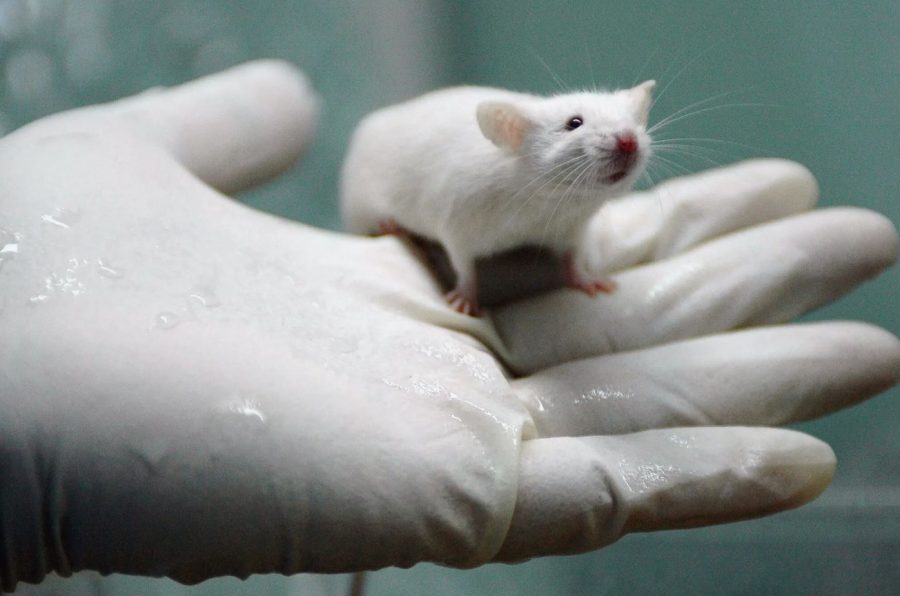Animal Testing: The Controversy Behind It
When animals are being used for testing, they are put in a specific laboratory where tests are run on them.
January 20, 2023
You anxiously wait for your turn to come. You hear the alarmed squeals of the other animals as they are put into cages. Soon after, they are tested with liquids, gasses, and other toxic chemicals. Believe it or not, this happens behind the scenes in the laboratories belonging to many companies- especially those that sell cosmetics. It may seem cruel, but what if this process saves the lives of humans? Different points of view on this subject have created ongoing arguments between groups and individuals.
According to a 2021 study taken by Cruelty-Free Kitty, “Of the 50 largest cosmetics companies ranked by market value as per Brand Finance in 2021, we found that 88% fund animal testing.”
Popular makeup brands such as Bobbi Brown, NARS, and MAC have stated that they do not participate in animal testing, except for in the past when it was required by law
in places like China. Other cosmetic brands such as e.l.f. cosmetics, The Ordinary, and Lush have refrained from doing so at all by not selling their products in locations that require testing.
“The main reason for opposition to animal testing of makeup products is the pain and suffering of the nonhuman animals, who can’t give consent to participate in experiments on their bodies. But on top of this, the physiology of nonhuman animal species is different from that of humans, and this makes animal testing a flawed method of assessing product safety,” says Sentient Media.
Others say that animal testing is crucial for the development of safe products for consumers.
Future of Working that “with this practice, we can make sure that people will never be exposed to any harmful chemicals or toxins in cosmetics, leading to a drop in consumer health risks. As argued by some scientists, testing cosmetics on animals before the products are introduced to the public is necessary for the manufacturing process, or people would be using products that are potentially harmful.”
Many people who condemn the usage of animals when testing cosmetics say that there are better alternatives to the process.
According to PETA, “Alternatives to animal testing include sophisticated tests using human cells and tissues ( also known as vitro methods),
advanced computer-modeling techniques (often referred to as in silico models),
and studies with human volunteers.”
Although there are effective alternatives to animal testing when it comes to cosmetics, people who support animal testing might not specifically advocate animal testing for cosmetics, but for medical research to assure that drugs and medicines are safe for humans to use.
“Nothing so far has been discovered that can be a substitute for the complex functions of a living, breathing, whole-organ system with pulmonary and circulatory structures like those in humans. Until such a discovery, animals must continue to play a critical role in helping researchers test potential new drugs and medical treatments for effectiveness and safety, and in identifying any undesired or dangerous side effects, such as infertility, birth defects, liver damage, toxicity, or cancer-causing potential,” says Stanford Medicine.
For many animal testing supporters, this provides justification to continue animal testing.
“Animal research has provided us with the ability to achieve life-changing discoveries through modern drugs, vaccines, and various procedures. Testing on animals has saved and improved millions of lives,” biobide states.
However, those against animal testing don’t find that animals are necessary for medical research.
“Human cells have been used to create innovative little devices called “organs-on-chips.” These can be used instead of animals to study biological and disease processes, as well as drug metabolism. Devices have already been produced that accurately mimic the lung, heart, kidney, and gut,” says Cruelty Free International.
Still, those who support animal testing disagree, saying that research done without animals isn’t fully effective.
“Studies that do not use animals can produce much valuable information, but they cannot completely replace the information gained from animal experiments. Only animals can demonstrate the effects of a disease, injury, treatment, or preventive measure on a complex organism,” says The National Academies Press.
With strong support on both sides, there isn’t a simple, quick solution. Diverse, informed viewpoints and opinions make animal testing a tough topic that continues to invite invaluable debate. Which side are you on?






